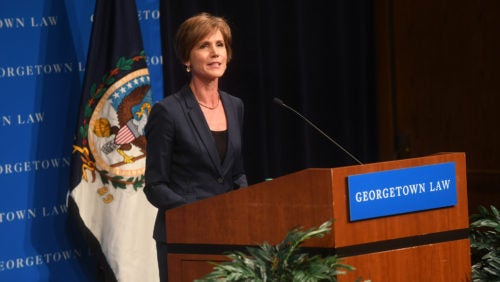Sally Yates Hosts “Democracy in the Balance” Conference at Georgetown Law
April 30, 2018

Former Deputy Attorney General and Georgetown Law Distinguished Lecturer from Government Sally Q. Yates hosted “Democracy in the Balance: The Essential Role of Democratic Institutions and Norms” at Georgetown Law on April 26.
“We’re not here today to debate any policy issues, and we’re certainly not here today to have a political contest,” Yates said at the start of the event. “We’re here today to talk about the framework of our democracy — the democratic institutions and norms that transcend any policy issues or any party affiliation — and without which, we devolve into something less than what our founders created, what our soldiers have given their lives to protect, and what our future generations deserve.”
The half-day conference featured panel discussions on the importance of a free press, the rule of law and an independent judiciary — exploring current challenges to longstanding democratic institutions and norms in the United States.
Experts included U.S. judges, former White House and Department of Justice officials, scholars and journalists. “It’s this diversity of political perspectives that demonstrates that the responsibility to preserve the pillars of our democracy falls to each and every one of us,” Yates said. “No one gets a pass because of their party affiliation. Presidents from both sides of the aisle have cautioned that the continued strength of our democracy is contingent upon our active participation.”
The rule of law panel included former Solicitor General Donald B. Verrilli Jr., who served during the Obama Administration; John Bellinger, former legal adviser for the State Department under President George W. Bush; Robert Bauer, former White House counsel under President Barack Obama; and Harvard Law Professor Jack Goldsmith, former head of the Office of Legal Counsel under George W. Bush. The group discussed the relationship between the Department of Justice and the White House historically and how that relationship is operating now.
Norms instilled within Department of Justice and the FBI, Goldsmith said, “have held so far,” Goldsmith said. But Verrilli noted that constraints on the “awesome prosecutorial power” of the DOJ are being tested out in the open.
“We are left to wonder, looking in from the outside, how much more is going on that you can’t see,” he said.
Current challenges
Georgetown Law Professor Martin Lederman led a panel on the importance of an independent judiciary, which included Judge Paul Friedman of the U.S. District Court for the District of Columbia; retired U.S. Circuit Court Judge Timothy Lewis and retired judge Patricia Wald of the U.S. Court of Appeals for the D.C. Circuit. The group looked at the effect of attacks and praise of judges for their decisions; the independence of state and federal judges; and threats to the public’s view of the judiciary.
“Of course it would be better if our leaders tried to refrain from the very personalized attacks on the judges,” Wald said, noting that the federal judges she knew were able to cope with criticism. “I don’t worry so much on the attacks on the decisions.”
While these are perilous times with respect to the issues discussed by the experts, presidential historian and author Jon Meacham offered his perspective on other disquieting moments in history, including Reconstruction, the Wilson years and McCarthyism.
Yates agreed at the conclusion of the day that despite the current challenges, our institutions are basically holding. Nevertheless, “holding really isn’t good enough, because public confidence in these institutions is equally important to the health of our democracy…” she said. “We can’t control what our leaders do, but we can control how we respond. Democracy is not a spectator sport…the continued vitality of our democracy requires that all of us participate, and all of us pay attention, and all of us make a difference.”
Privileged
Georgetown Law Dean William M. Treanor, who introduced the event, said he was proud to have Yates serve as Distinguished Lecturer from Government this year. Yates delivered Georgetown Law’s Hart Lecture in November and has met with students numerous times. “I’m just dazzled by the way she has reached out to this community…,” Treanor said. “We are privileged to have someone who is dedicated to the rule of law and we’re privileged to have this extraordinary group of panelists talking about that topic today.”
Yates, in turn, thanked Treanor for ensuring that students leave Georgetown Law with an understanding of, and an appreciation for, the Constitution and our system of laws — “not as passive admirers, but rather as active protectors.”